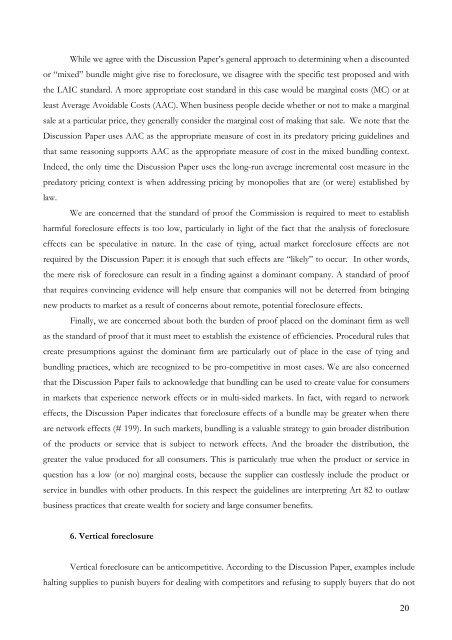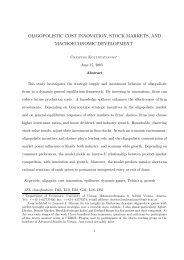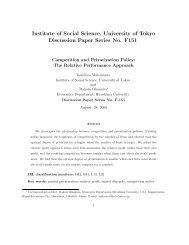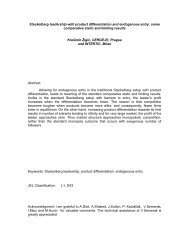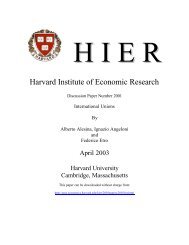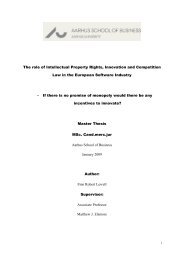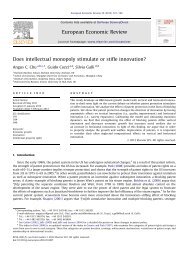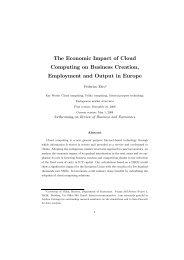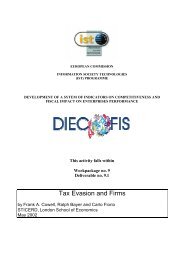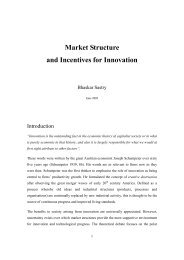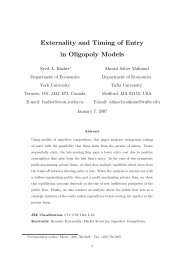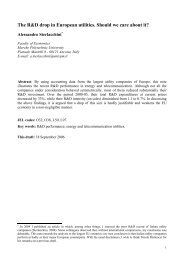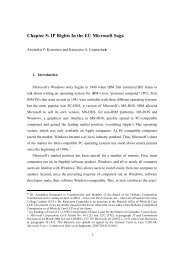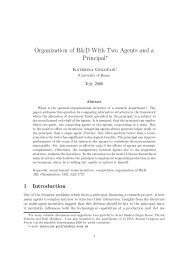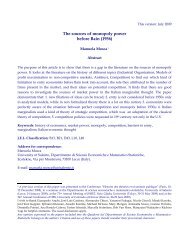The EU Approach to Abuse of Dominance - Intertic
The EU Approach to Abuse of Dominance - Intertic
The EU Approach to Abuse of Dominance - Intertic
You also want an ePaper? Increase the reach of your titles
YUMPU automatically turns print PDFs into web optimized ePapers that Google loves.
While we agree with the Discussion Paper’s general approach <strong>to</strong> determining when a discounted<br />
or “mixed” bundle might give rise <strong>to</strong> foreclosure, we disagree with the specific test proposed and with<br />
the LAIC standard. A more appropriate cost standard in this case would be marginal costs (MC) or at<br />
least Average Avoidable Costs (AAC). When business people decide whether or not <strong>to</strong> make a marginal<br />
sale at a particular price, they generally consider the marginal cost <strong>of</strong> making that sale. We note that the<br />
Discussion Paper uses AAC as the appropriate measure <strong>of</strong> cost in its preda<strong>to</strong>ry pricing guidelines and<br />
that same reasoning supports AAC as the appropriate measure <strong>of</strong> cost in the mixed bundling context.<br />
Indeed, the only time the Discussion Paper uses the long-run average incremental cost measure in the<br />
preda<strong>to</strong>ry pricing context is when addressing pricing by monopolies that are (or were) established by<br />
law.<br />
We are concerned that the standard <strong>of</strong> pro<strong>of</strong> the Commission is required <strong>to</strong> meet <strong>to</strong> establish<br />
harmful foreclosure effects is <strong>to</strong>o low, particularly in light <strong>of</strong> the fact that the analysis <strong>of</strong> foreclosure<br />
effects can be speculative in nature. In the case <strong>of</strong> tying, actual market foreclosure effects are not<br />
required by the Discussion Paper: it is enough that such effects are “likely” <strong>to</strong> occur. In other words,<br />
the mere risk <strong>of</strong> foreclosure can result in a finding against a dominant company. A standard <strong>of</strong> pro<strong>of</strong><br />
that requires convincing evidence will help ensure that companies will not be deterred from bringing<br />
new products <strong>to</strong> market as a result <strong>of</strong> concerns about remote, potential foreclosure effects.<br />
Finally, we are concerned about both the burden <strong>of</strong> pro<strong>of</strong> placed on the dominant firm as well<br />
as the standard <strong>of</strong> pro<strong>of</strong> that it must meet <strong>to</strong> establish the existence <strong>of</strong> efficiencies. Procedural rules that<br />
create presumptions against the dominant firm are particularly out <strong>of</strong> place in the case <strong>of</strong> tying and<br />
bundling practices, which are recognized <strong>to</strong> be pro-competitive in most cases. We are also concerned<br />
that the Discussion Paper fails <strong>to</strong> acknowledge that bundling can be used <strong>to</strong> create value for consumers<br />
in markets that experience network effects or in multi-sided markets. In fact, with regard <strong>to</strong> network<br />
effects, the Discussion Paper indicates that foreclosure effects <strong>of</strong> a bundle may be greater when there<br />
are network effects (# 199). In such markets, bundling is a valuable strategy <strong>to</strong> gain broader distribution<br />
<strong>of</strong> the products or service that is subject <strong>to</strong> network effects. And the broader the distribution, the<br />
greater the value produced for all consumers. This is particularly true when the product or service in<br />
question has a low (or no) marginal costs, because the supplier can costlessly include the product or<br />
service in bundles with other products. In this respect the guidelines are interpreting Art 82 <strong>to</strong> outlaw<br />
business practices that create wealth for society and large consumer benefits.<br />
6. Vertical foreclosure<br />
Vertical foreclosure can be anticompetitive. According <strong>to</strong> the Discussion Paper, examples include<br />
halting supplies <strong>to</strong> punish buyers for dealing with competi<strong>to</strong>rs and refusing <strong>to</strong> supply buyers that do not<br />
20


